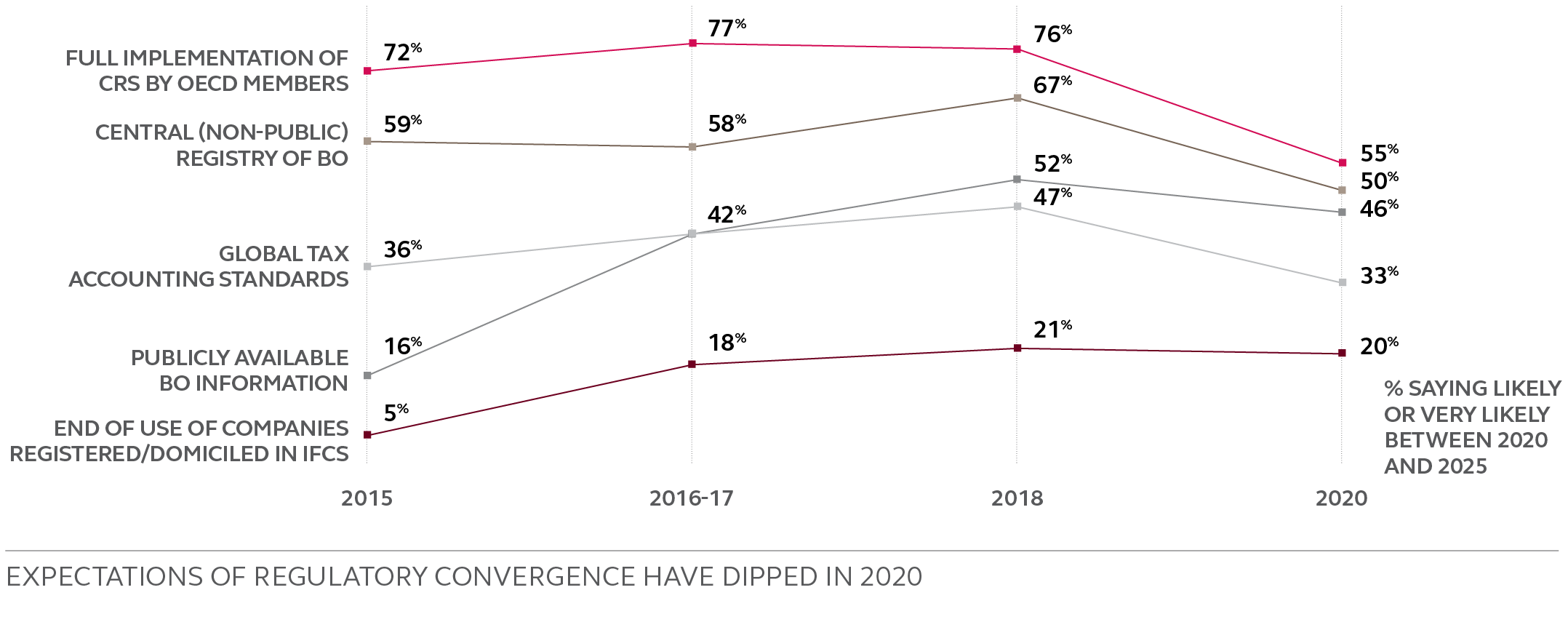The difference six months makes: global regulatory convergence to continue

The ongoing convergence of global regulatory frameworks has been an overarching theme for the corporate services industry in the past decade. Our research has historically supported this view by showing that the expectation for regulatory convergence would rise year-on-year.
However, for the first time since 2015, the Vistra 2030 thought leadership report – Unlocking Opportunity for the Decade Ahead found that expectations for global regulatory alignment had visibly declined – survey respondents said they expected less alignment in the 12 months ahead. This included expectations regarding the full implementation of the Common Reporting Standard (CRS) and the global adoption of central beneficial ownership registries, among others.

So why the change of views? Covid-19 appeared to be a major factor, with almost half of survey respondents (46%) saying the pandemic would cause delays to global convergence of regulatory and financial transparency standards. Other geopolitical factors, including the US-China trade war, the detached relationship between the US and Europe, Brexit and the debate between EU member states, seemed to support this change of view.
As stated by Jonathon Clifton, Asia-Pacific Regional Managing Director at Vistra, the perception of regulatory divergence in 2020 could be due to “fractious times underpinned by geopolitical and economic uncertainty.”
A look six months on – new data suggests otherwise
We were frankly surprised by the initial survey results of the 2020 research as we presumed ongoing expectations of global regulatory convergence. Our initial assumptions were validated when we re-visited the matter six months later during our series of Vistra 2030 webinars.
The polls from the Vistra 2030 webinars suggest that the expected regulatory divergence in 2020 was an anomaly. Rather, 84% of all webinar attendees expect greater levels of regulatory convergence over the next five years*.
Webinar attendees included practitioners based in traditional offshore jurisdictions where the regulatory environment has continued to evolve significantly for more than a decade. Hence, these respondents acknowledged that the pressure for offshore jurisdictions to comply with international regulations will continue for the foreseeable future.
The difference in results from the initial survey to the webinar polls six months later, was likely caused by uncertainties in the global political environment at the time when the survey was conducted. This suggests that although there are external factors that come into play (such as the Covid-19 pandemic or political tensions), ultimately, the underlying drive for regulatory convergence is still at play.
Global regulatory convergence picking up pace
In an increasingly post-pandemic world, and with a new US Administration in place, we expect to see a greater willingness for cooperation between the US, the EU and other markets to drive greater transparency of private and corporate clients’ financial activity.
Global regulatory alignment appears to be gaining momentum again. This can be seen in the new legislation to impose beneficial ownership reporting requirements on certain businesses in the US, and even more so in recent proposals led by the US and the G7 nations in relation to global corporate minimum tax rates.
Regulatory convergence has been underway for the last decade and more. As Simon Filmer, Global Head of Company Formation at Vistra, says
“We need to recognise that some level of convergence is inevitable because these regulations are set by supranational bodies. Despite all these regulatory standards, international finance centres have proven their resilience time and time again and will continue to evolve their offerings.”
Looking ahead, international alignment on tax, transparency and substance regulations, once again, seems inevitable.
*One of the poll questions attendees were being asked during the Vistra 2030 webinars held from October 2020 to March 2021: “Between now and 2025, I expect to see greater convergence of regulation, (around tax, data transparency, etc) internationally?”
Find out more about Vistra 2030 and download the report here
The contents of this article are intended for informational purposes only. The article should not be relied on as legal or other professional advice. Neither Vistra Group Holding S.A. nor any of its group companies, subsidiaries or affiliates accept responsibility for any loss occasioned by actions taken or refrained from as a result of reading or otherwise consuming this article. For details, read our Legal and Regulatory notice at: https://www.vistra.com/notices . Copyright © 2024 by Vistra Group Holdings SA. All Rights Reserved.

